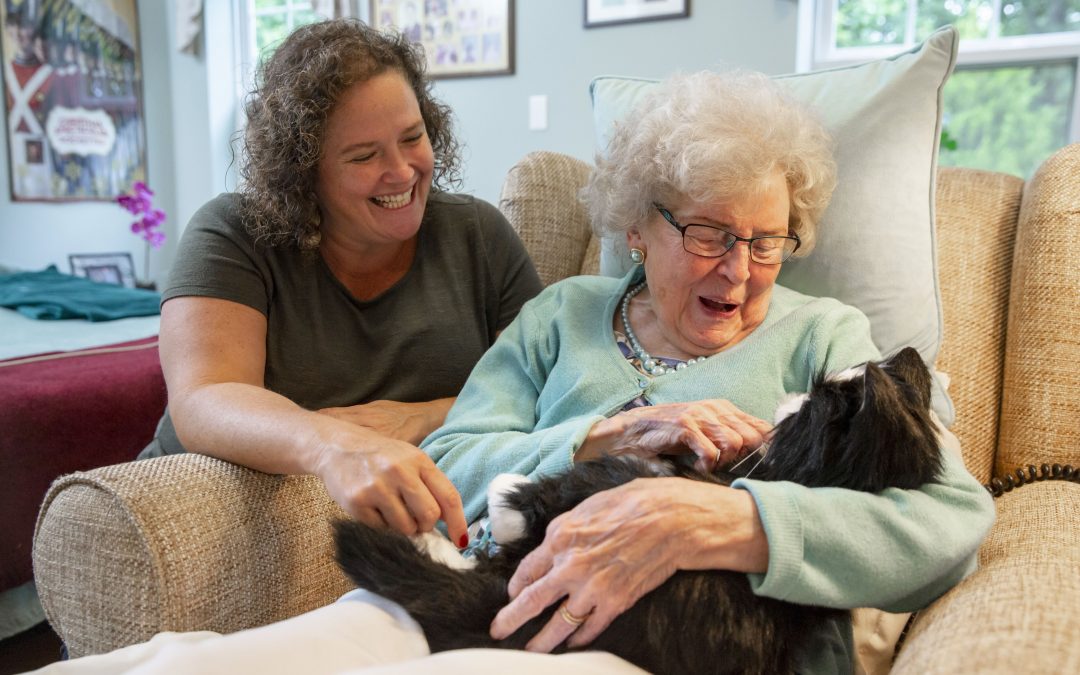
Apr 27, 2025 | Industry Topics, Research
They also found that the presence of pets, whether real or robotic, helped participants’ subjective well-being. “I got a lot of pleasure out of the program, and Barney being there, of course, but I liked [the robotic pet] the best … I get very lonely here, so the program has helped facilitate social connections for me,” said an older adult.

Apr 7, 2025 | Featured Posts, Research
The following white paper is a summary of over 10 research studies and the thematic results coalesced from them. Findings include reduced feelings of depression, isolation and loneliness; reduced use of medication; increased cognitive activity; increased feelings of purpose; and reduced burden of care for care partners.

Mar 19, 2025 | Industry Topics, Research
Older age, the onset of depression and increased loneliness can significantly contribute to the risk of dementia and cognitive decline, according to two separate studies.

Feb 3, 2025 | Industry Topics, Research
Loneliness, social isolation and living alone are significant risk factors for mortality, particularly in older adults, according to the results of a new study.
Researchers from Greece, Italy and Canada analyzed 86 previous studies to quantify the relationships between those social dynamics and mortality risk. Their findings were published in the journal Aging Clinical and Experimental Research.

Apr 9, 2024 | Research
Read the study
Abstract
Study Objective
The purpose of this study is to determine whether introducing a robotic companion cat into a long term care facility may improve affect and, subsequently, increase participation for residents with dementia, and to determine potential benefits for caregiver roles and relationships with individuals with dementia.
Background
The number of people with dementia is growing, and the behavioral and psychological side effects are negatively affecting the quality of life for these people as well as their caregivers. Additional research is needed to help develop and confirm the use of nonpharmacological treatment for dementia with therapeutic robots.
Study Subjects
Research was conducted at Bridgewater Retirement Community in the complete-care nursing households. We recruited 11 participants, ages 81-95, and all data was collected within each resident’s household and common area. All participants had a diagnosis of dementia, resided in a long-term care facility, and relied on assistance from caregivers for some or all activities of daily living.
Methods
Data was collected using a mixed-methods design that combined both quantitative and qualitative measures. Quantitative measures included a pre and post Cohen-Mansfield Agitation Inventory (CMAI) (Appendix A), completed by the household coordinators, as well as weekly behavior log and physiological indexes (heart rate and oxygen saturation) (Appendix B), used to objectively document our observations and interactions with the cat.
These measures were used to determine the efficacy of a robotic companion on agitation. Qualitative measures included weekly observational data and staff reports as well as a final questionnaire for the household coordinators to summarize their overall impression of our study on the participants. These measures were used to determine the perceived quality of life of individuals with dementia and their caregivers. Use of psychotropic and pain medication was determined by review of the Medication Dispensing Record after the data was collected.
Results
We found a statistically significant reduction in agitation scores from the beginning of our study to the end, along with a statistically significant increase in oxygen saturation throughout the course of the study. There were no significant changes in heart rate from preintervention to post-intervention (Table 1). Qualitative data collected throughout the course of the study were sorted into categories and analyzed for emerging themes. The data for each participant for each interaction over the course of the study is displayed in Figure 1. Overall themes over the course of the study are displayed in Figure 2. We did not find any significant reduction in the use of psychotropic medications over the course of the study. The household coordinator’s responses to the final questionnaire were overwhelmingly positive and described the impact that the robotic companion cats had made on their residents and their caregivers.
Conclusion
The use of robotic companion cats enhances the well-being and quality of life of individuals with dementia living in a long-term care facility by providing companionship and interaction with their environment which helps to reduce anxiety and agitation. Robotic companion cats also reduce the burden placed on caregivers by providing a nonpharmacological intervention for agitation and loneliness. Due to our small sample size, it is still difficult to draw any major conclusions about the use of nonpharmacological therapy as an adjunct to pharmacological therapy in the long term treatment of dementia. Though these effects were not seen across all participants, the researchers believe that the impact these companion cats have had on a few individuals is significant enough to prompt future research and continue exploring other non-pharmacological options for improving the day to day life of an individual with dementia.
Read the study

Dec 9, 2022 | Research
Abstract
Purpose
Differences in depression and loneliness, during the COVID-19 pandemic, for older adults with mild to moderate dementia living in residential care after interacting with a robotic companion dog or cat were explored. Experiences of family members and professional caregivers were also examined.
Design
This study used a mixed research design with pre- and post-questionnaires on depression and loneliness.
Method
Quantitative data exploring the impact of companion pets on depression and loneliness were collected from participants pre-intervention and at 3- and 6-week intervals. Qualitative data were collected during the 6-week study period, permitting researchers to explore the impact of robotic companion pets on participants, family members, and professional caregivers.
Findings
Results indicated depression (χ2F(2) = 21.29, p < 0.001) and loneliness (χ2F(2) = 21.11, p < 0.001) improved. Moreover, participants were engaged with their companion pet, providing meaningful, activity and positive experiences.
Conclusions
Robotic companion pet therapy, a holistic, nonpharmacologic animal-assisted therapy (AAT), changed the AAT landscape at the study site and provided an alternative option to live pet therapy during COVID-19. Participant interactions with their robotic companion pets enhanced their well-being and quality of life, especially during stringent COVID-19 restrictions and social isolation.
Read the study





